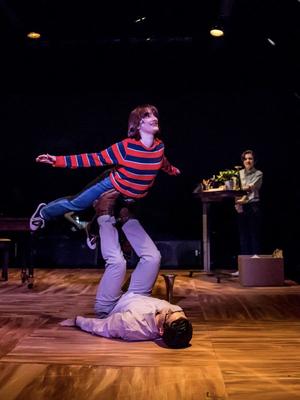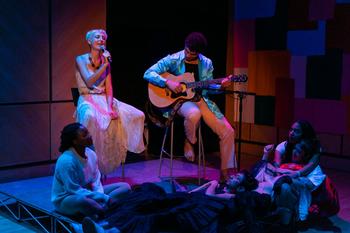Right to Produce
Securing the “Right To Produce”
It is the policy of Yale College that any person or organization wishing to present a theatrical production on campus must secure and pay for the Right to Produce from the appropriate publisher or author’s representative. A copy of the Right to Produce must be submitted to Undergraduate Production in order for a production to be approved by this office. Further, any person or organization wishing to use copyrighted music in connection with a theater or dance production must secure and pay for the right to use the music. Definitions of dramatic and non-dramatic use may be found here: http://www.ascap.com/licensing/termsdefined.aspx (Click dramatic or grand rights to expand that section.)
Adapting Work
The adaptation of an existing creative work, such as a novel or short story, into a play or musical is considered a derivative work under copyright law. Only the owner of copyright in a work has the right to create an adaptation of the work, and accordingly, only the owner may authorize another to create such an adaptation. A student creating an adaptation as a part of their academic coursework may be able to create the work under the fair use or classroom use exceptions to copyright. A student who plans to create such a work as an extracurricular project should contact the copyright holder, usually the author or their publisher, to request appropriate permissions. A student who wishes to stage a curricular adaptation for an audience outside of the classroom should also seek permission. A basic sample agreement for adaptation can be found here. Resources regarding fair use and the analysis required to make a determination can be found here.
Securing Rights for Orchestral Performance
Zinfonia acts as a central clearinghouse for music rental for all the major classical music publishers (Boosey & Hawkes, G. Schirmer, EAM, Presser, etc.) and has a reliable and intuitive search and rental system. Zinfonia offers clearing for rental of the physical sheet music protected under copyright, and the licensing fee from the publisher for use of that material in a concert setting. This is only necessary for music composed that is still under copyright protection. Rare pieces which cannot be found on Zinfonia will require sleuthing. Begin by looking up the work in Daniels’ “Orchestra Music, a Handbook” at the library as a first step.
For public domain music, free PDFs of scores and parts can be found via the Petrucci Music Library, maintained by IMSLP.org. Questions about securing rights to produce orchestral work should be directed to brian.s.robinson@yale.edu.
The following is reproduced with minor adaptation from “Obtaining Rights to Produce a Play or Musical or Use Music in Live Performances” by Rachel Durkin, Manager of Performing Arts Center, College of Fine Arts - University of Texas at Austin Available at “A Copyright Crash Course” by Georgia Harper under a Creative Commons License agreement.
Obtaining Rights to Produce a Play or Musical
The rights for most plays and musicals are held by play publishing houses. To obtain the rights to produce a play or musical, complete the following steps:
1. Determine which play publishing house has the rights to the play you wish to produce.
2. Contact the company to find out if the play is available for production. In some instances, plays are “restricted” which means that a particular play/musical is not available for production. Never assume that a play is available. Always check with the play publishing house before you advertise or begin work on the production.
3. Request rights to produce the work, usually via an online form at the company website. Generally the following information is needed in order to provide a royalty quote
a. Play Title
b. Place of performance (City, State & Theater)
c. Producing organization
d. Seating capacity
e. Ticket prices
f. Not-for-profit or for-profit group
g. Number of performances
h. Performance dates
i. Equity (Actor’s Union) or non-Equity production
4. Once your request is received, you will be sent a quote for the royalty fee and if acceptable, a contract may be sent. Some companies however will simply send an invoice.
5. Be aware that for plays, the royalty fee covers the royalty only. Scripts are extra, however, plays may also be ordered directly from the publishing house.
6. For musicals, the fees to produce a work are generally higher and will include a royalty fee, a rental fee (for scripts and scores), and a refundable security deposit.
Please note: Yale College Undergraduate Production requires that students use a tracking system when returning rented scripts, musical scores, or other materials by mail. We strongly encourage that you also insure these packages. In some cases, specific insurance parameters will be required by your agreement with the rental house. Students may be held financially liable for late fees or replacement costs for lost materials.
A list of play/musical publishing houses, as well as some good research websites is provided at the end of this section. If the play you wish to produce is not held by any of these publishing houses, you will need to find a copy of the play to find the publisher’s information. Contact that publisher and ask them to refer you to the correct source for obtaining producing rights.
Obtaining Rights to Use Music in Live Performances
One of the biggest misconceptions about music rights is that if you are a student or employee at a college or university, the rights are already taken care of by the educational institution. This is true, but only in a limited sense. While Yale, like many other universities, has secured blanket licenses from all three performance rights societies, ASCAP (American Society of Composers, Authors and Publishers), BMI (Broadcast Music, Inc.) and SESAC, the licenses are narrow in terms of what is covered by the blanket licensing fee. These standard university licenses do not include “grand rights,” which is defined as the use of music in a “dramatic setting.” This means that if you are presenting a play or dance performance, you may not use any copyright protected music without first obtaining permission. The first thing to do is to gather as much information as possible about the song you want to use. Look on the CD label for the following information:
- Record Company
- Record Company’s address, phone number
- Name of song
- Artist who performed the song
- Who wrote the song
- Album title
The process of getting permission varies depending on how you want to use the song. If you want to use a specific artist’s version of a song, you’ll need to contact the record company and the publisher (the publisher can usually be found via ASCAP, BMI or SESAC). If you want to have someone sing or play a song live, you need to find out who represents the composer and lyricist and contact them, as well as the publisher. The specifics for each situation are detailed below. If you want to use a specific artist’s version of a song, you would need to contact the record company and publisher. If the CD label did not provide an address for the record company, check the Internet for the information. Whenever possible, it is best to find out what information the record company needs or if there is a specific form that needs to be completed in order for your request to be considered. Generally, when you contact the record company, there is some basic information they will want to know:
- What song do you want to use?
- How much of the song will you use? (Give an exact timing)
- How many other songs will be used in the production?
- What is the production? (A play? A dance performance?)
- If it’s a play, they will want to know the play title and what the play is about. Some companies may even want to have a copy of the scene during which the music will be played
- If it’s a dance performance, they will want to know what kind of dance it is.
- Who is presenting this performance? (A university, an amateur theatre, a professional theatre, etc.)
This is just a general list of information that may be required. Again, it is best to find out the specific requirements for each record company. If you want to play or sing a song live during a performance, you need to contact the composer’s/lyricist’s representative and the publisher. The best place to find out who the representatives are is via the internet. ASCAP, BMI, SESAC, and AMR have web sites and represent the interests of composers, lyricists and publishers. These three web sites allow you to search a database by song title or composers’ name and in most instances, will indicate who holds the rights to that particular song. If you try all three web sites and the song is not listed at either site, you must contact the record company. They may be able to provide information on who to contact.
Some cautionary notes:
- Be aware that you may need to contact more than one representative. The number of representatives you may need to contact is often based on how many composers/lyricists worked on a song.
- Be sure that the person you deal with has the authority to grant permission for your particular usage.
Publishing/Licensing Companies
Websites
www.stageplays.com
https://aact.org/play-sources-1
Publishers for Theater and Musical Theater
Anchorage Press Plays
800-448-7469
www.applays.com
Dramatic Publishing
800-448-7469
www.dramaticpublishing.com
Dramatists Play Service, Inc
212-683-8960
www.dramatists.com
Music Theatre International
212-541-4684
www.mtishows.com
Note: All requests for rights from MTI must be made through Undergraduate Production. If you would like a quote for rights held by MTI, please contact Nathan Roberts with Theater, Dance, and Performance Studies inquiries, and any of the Undergraduate Production Technical Directors with all other inquiries.
One Act Play Depot
oneactplays.net
Pioneer Drama Service
800-333-7262
www.pioneerdrama.com
Rodgers & Hammerstein Theatre Library
800-400-8160
www.rnh.com
Note: All requests for rights from Rodgers & Hammerstein must be made through Undergraduate Production. If you would like a quote for rights held by Rodgers & Hammerstein, please contact Nathan Roberts with Theater, Dance, and Performance Studies inquiries, and any of the Undergraduate Production Technical Directors with all other inquiries.
Samuel French, Inc
866-598-8449
www.samuelfrench.com
Tams Witmark Music Library, Inc
212-688-9191
www.tams-witmark.com
Note: All requests for rights from Tams Witmark must be made through Undergraduate Production. If you would like a quote for rights held by Tams Witmark, please contact Nathan Roberts with Theater, Dance, and Performance Studies inquiries, and any of the Undergraduate Production Technical Directors with all other inquiries.
